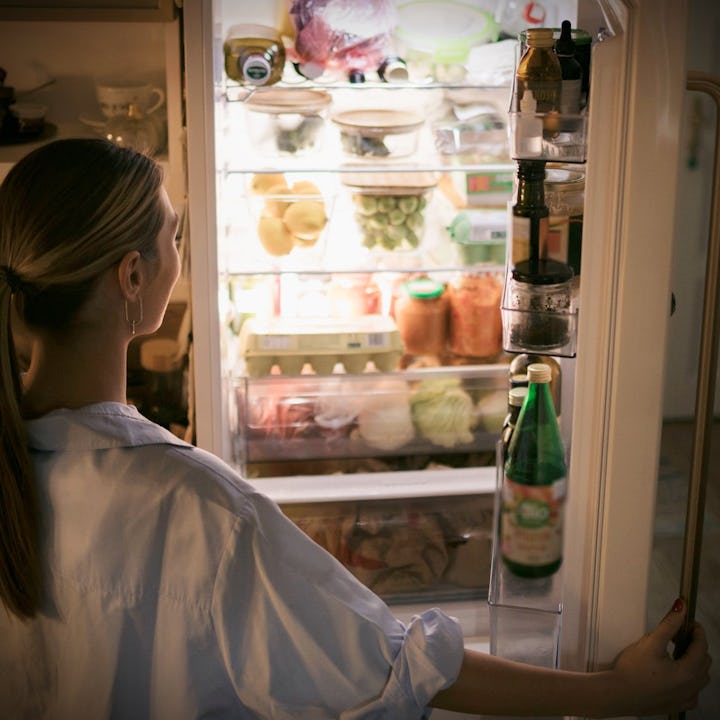You Know What Foods To Avoid At Bedtime, But What Foods Help You Sleep?
Turns out, specific nutrients can help you drift off faster.

Many wellness fads focus on the types of foods and ingredients to avoid to achieve "greater" health, often sidelining the foods that can help us succeed in our wellness goals. Case in point: We've all heard about foods that can reportedly wreck our sleep or how long of a window we should allow between eating and sleeping. And while experts agree that eating too close to bedtime will disrupt our sleep cycle, some foods may actually promote restfulness if consumed within those boundaries.
Specifically, certain nutrients have the ability to impact your going-to-bed ease and the quality of your rest. Tryptophan, for example, helps with serotonin production, which in turn supports the production of melatonin — a naturally occurring hormone that regulates sleep-wake cycles. Melatonin itself is essential for your body's understanding of the circadian rhythm. Foods rich in magnesium, on the other hand, will help with muscle relaxation, clearly benefiting your sleep.
Before highlighting some of these foods, a reminder: As licensed clinical and medical psychologist Leah Kaylor points out, "Timing matters when it comes to eating before bed," even if you're consuming sleep-friendly foods.
"Finish your last meal of the day, and no more alcohol, at least three hours before bed," she advises. "Late-night digestion not only disrupts the onset of sleep but also significantly impacts sleep quality, particularly the deeper and more restorative phases like deep sleep and REM sleep."
With that in mind, here are a few sleep-friendly foods to make part of your last meal of the day.
Kiwis
Often overlooked, the kiwi is a great rest-inducing snack. The pungy green fruit boasts nutrients, serotonin, and antioxidants, which are known to improve both the quality and duration of sleep.
“Research has found that eating just two kiwis before bed [can be very beneficial],” says registered dietitian Erin Palinski-Wade.
Tart Cherries
Another not-too-common fruit that happens to be an excellent sleep-inducer is the tart cherry. Often dried or served as juice concentrate (you may have seen the viral TikTok drink), tart cherries are more sour and tangy than their more "traditional" counterparts. They also tend to boast higher levels of anthocyanins, a type of antioxidant that helps with inflammation and sleep.
Palinski-Wade specifically mentions melatonin as a key nutrient that will aid in lengthening your sleep while also helping you fall asleep faster. She suggests drinking a 4-to-8 punch glass of 100% tart cherry juice every night to fight insomnia.
Lettuce
Salads of all sorts are always championed as great wellness foods, especially when prepared with romaine lettuce, a great source of vitamin A, minerals, and antioxidants. This specific type of lettuce, though, also boasts lactucin, which has mild sedative effects, basically helping your nervous system calm down naturally.
Greek Yogurt
Given all the negative feedback on dairy consumption recently, using Greek yogurt as a sleep aid might sound counterintuitive, yet here we are.
According to a 2020 study, low levels of vitamin D are linked to poor sleep quality, although the specific relationship between the two has yet to be extensively understood. Generally speaking, though, dairy foods contain both vitamin D and tryptophan, making them ideal pre-bedtime go-tos — when consumed healthily, of course.
Bananas
High in potassium and magnesium, both natural muscle relaxants, bananas fall squarely in the category of sleep-inducing fruits — especially since they also provide a small amount of tryptophan per serving.
Pistachios
We're constantly hearing about the benefits of nuts, and here is a not-too-often cited one: According to Palinski-Wade, pistachios have one of the highest melatonin levels among all nuts (although, to be fair, the studies are limited — more research would better support these claims) and also contain sleep-promoting tryptophan. Grab a handful a few hours before bed every night and try to detect a shift in resting patterns.
What's more, pistachios are pretty rich in magnesium, often touted as a natural sleep aid that activates the parasympathetic nervous system, which, in turn, promotes calmness and relaxation.
Turkey
When looking at proteins, turkey boasts some of the highest levels of tryptophan, a key amino acid for regulating sleep. Sure, downing a turkey sandwich won't put you straight to bed, but it might support a better sleep overall — particularly when compared to, say, steaks or chicken thighs.
So, which foods are you reaching for before bed?